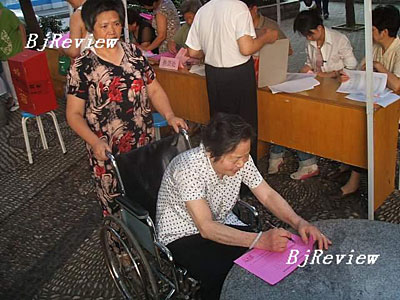|

Ningbo City in Zhejiang Province became the first entire city to implement direct community election earlier this year. On January 4, 2008, the Civil Affairs Bureau of Ningbo City announced that more than 730,000 registered voters in the city's 235 communities had elected a total of 2,266 new members of residents' committees in newly concluded direct elections. This made Ningbo the first Chinese city to have all residents' committee members directly elected by residents themselves.
"This has been a good opportunity for residents to be educated on enforcing democracy," Xu Yiping, Vice Director of Civil Affairs Bureau of Ningbo City, told Beijing Review.
Primary-level democracy
In community elections throughout the second half of 2007 in Ningbo, any resident over 18 years old, whether a permanent resident or a migrant worker that had lived in the community for over half a year, could register as a candidate or voter. The inclusion of migrant workers has political significance since usually they can only register to vote in their hometowns.
In Ningbo's election model, a recommendation letter signed by over 10 registered voters can qualify a candidate for membership in a residents' committee. During the election campaign, candidates could earn voters' trust by debating with each other on issues directly concerning residents' interests. They could also visit residents' homes to understand their needs and to make their own campaign guidelines known to potential voters.
To eliminate any fraud in the elections, the city's Civil Affairs Bureau designed complicated balloting procedures. This also contributed to the high turnout of voters. The average voting turnout in Ningbo was 92.6 percent, and in Zhenhai District it was a staggering 98 percent.
The elected committee members in Ningbo are no longer full-time employees receiving salaries from the local government. They are volunteers who discuss and decide on major issues concerning the interests of their communities. Their decisions will be implemented by full-time community workers who are paid by local government. However, to guarantee the obedience of community workers to residents' committees, the latter has been given the authority to fire incompetent community workers.
Community reform
Urban residents' committees have been called "the bound-feet brigade" in cities since the 1980s. This nickname vividly reflects the common demographic of their members back then: sometimes illiterate, mostly female and retired, despite the fact that foot-binding had ended decades ago and most had normal feet.
Under a modest stipend from the local government, residents' committee members undertake a wide range of responsibilities in their communities, usually between 1,000 and 3,000 households. They are security guards that patrol the neighborhood daily in ominous red armbands, mediators of family fights, lecturers on government policies and regulations, door-to-door deliverers of free rat poison bait issued by the government and housekeepers of the neighborhood that monitor its overall tidiness. If the government has given them enough expenses, they set up a leisure center for the elderly to play cards, a public library and a clinic in the community. All in all, they provide the services for residents that are too trivial for the government and too unprofitable for corporations.
According to the Organic Law of Urban Residents' Committees adopted in 1989, they also have responsibility to cooperate with government branches when their work directly concerns residents.
| 